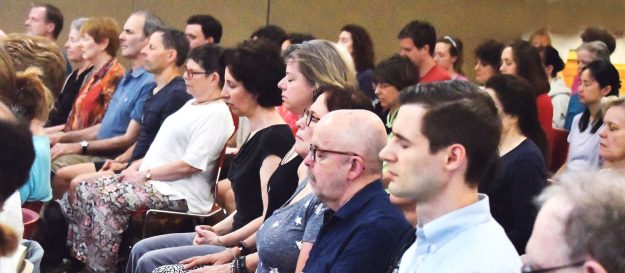‘We sort of fell in love with each other over Zoom,” says Allan Lokos, guiding teacher and founder of New York’s Community Meditation Center (CMC), of his successor, Bart van Melik. We were speaking with van Melik over Zoom, as it were, while he called in from his home country of the Netherlands on a blustery spring evening. The CMC rising guiding teacher, who also teaches at the New York Insight Meditation Center, agreed. “Allan is my first pandemic-era friend.”
After connecting via Zoom last year, Lokos invited van Melik to teach at CMC. “That was a very positive experience for me, even though it was online,” he said, before checking to make sure the wind wasn’t obscuring his words. “You get a sense of the kind of person Bart is,” Lokos added, “when he steps up and takes responsibility for the wind that’s blowing.”
On June 27, Lokos and van Melik will teach a special joint session, and on July 1, van Melik will officially take over as the guiding teacher at the Community Meditation Center. He is taking on the role for the same reason the sangha has grown so much in its 15 years: the emphasis on community. For van Melik, interpersonal connections are crucial—whether they occur over Zoom or not.
When Lokos founded the center in 2007 with his wife, Susanna Weiss, growth was slow. There were seven people at the first, 15 a few months later, and just 30 people six months in. When Lokos shared his discouragement with his teacher, Sharon Salzberg, she said, “It’s not how many people are there. It’s, ‘Do you reach even one person?’” Lokos recounts. “That meant a lot to me at that moment, and always did. And for some reason, that’s when CMC really started to grow.”
Salzberg, now part of the center’s permanent faculty, became CMC’s first guest teacher, after which teachers such as Martine Batchelor, Stephen Batchelor, Rev. Cathy Bristow, Joseph Goldstein, and Lama Rod Owens followed. Van Melik will continue working with guest teachers and the faculty, which includes Leslie Booker; Venerable Burin; Pilar Jennings, PhD; Andrew Olendzki, PhD; Rachel Hammerman; and Vera Ruangtragool.
When he first started inviting teachers, van Melik recalls the enthusiasm they expressed for joining the community. Pre-pandemic, 100 people might show up for a Sunday session. When sessions moved online, that number climbed closer to 150 people, and van Melik points out that he regularly sees the same faces showing up on the screen. He also loves the 15-minute breakout discussions that CMC holds after teachings, even virtually, and plans to carry forth this space to form personal relationships.

Lokos notes that a few significant events did draw attention to the sangha to contribute to its growth. Among them, three books by Lokos and, most notably, a 2012 plane crash in Myanmar that left him and Weiss seriously injured. “The first day that Susanna and I came back was a big, emotional day,” Lokos says, before adding, “I think we should probably plan on that being just a once-in-a-lifetime event.”
The emphasis on inclusion, however, is what has sustained CMC’s growth. Lokos credits Weiss as the driving force who makes everyone feel welcome. “We really wanted to destroy ‘us and them’ mentality,” he says. As a result, the center has never had a formal membership program and has never charged.
“Again, and again, and again, what I heard from people was, they walked in and they felt at home,” Lokos says, before recounting a special memory. Several years ago, a widow who was sitting shivah, a seven-day grieving period where mourners typically stay at home, told her rabbi that she needed to leave the house on Sunday to be with her sangha. More than a few marriages have occurred between community members, too.
“When you look at how meditation is offered in a more commercial way, it’s an offer like, ‘Oh, you could do it at home, just like you do your fitness,’” van Melik says. “And I think that a major component that is often missed is that element of actually being together. And that is something that I feel very, very strongly at CMC.”
Though the Sunday and Wednesday teachings will remain online for now, whenever the center reopens for in-person sessions, van Melik suspects a virtual component will remain. Practitioners are able to join from all over the world now, and, after all, Zoom didn’t stand in van Melik and Lokos’s way.